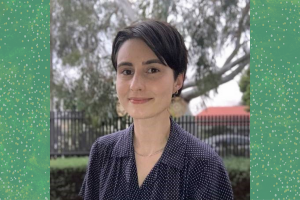Dr Rachel Joyce
Interrogating the cell of origin of BRCA2-mutant breast cancer to inform targeted prevention strategies

Dr Joyce is now undertaking an Peeneeyt Thanampool (Strong Women) Aunty Joan Vickery and Aunty Angela Clarke MDHS Indigenous Post-doctoral Fellowship.
Abstract
It is currently estimated that approximately one woman dies every minute of breast cancer across the globe. While the greatest risk factor for developing breast or ovarian cancer is merely having female reproductive organs, the cumulative life-time risk of developing breast and ovarian cancer for women who carry pathogenic mutations in their BRCA genes is significantly higher than non-carriers. Men who harbour mutations in their BRCA genes are also at increased risk of developing breast cancer within their lifetime. Currently there are no clinically approved strategies for breast or ovarian cancer prevention in BRCA mutation carriers beyond highly invasive and irreversible surgical procedures such as prophylactic mastectomy and bilateral salpingo-oophorectomy. Targeted therapeutic strategies for cancer prevention in BRCA mutation carriers are thus a sought-after alternative.
Significant headway has been made by our research group and others in identifying RANK-ligand inhibition as a putative chemoprevention strategy for the onset of breast cancer in female BRCA1 mutation carriers; subsequently, a phase 3 international clinical trial BRCA-P (ClinicalTrials.gov Identifier: NCT04711109) is currently recruiting female BRCA1 mutation carriers to assess the efficacy of RANK-ligand inhibition in preventing breast cancer development using the FDA-approved drug denosumab. A portion of this thesis describes the functional and biological consequences of denosumab treatment on the putative cell-of-origin of BRCA1 mutant breast cancer, the RANK+ luminal progenitor, from patients enrolled in the Melbourne Health BRCA-D pre-operative window study; these patients received denosumab treatments prior to undergoing prophylactic mastectomies. This work indicated that BRCA1 mutation carriers who received 1 denosumab injection per month for 3 months had significantly reduced numbers of RANK+ luminal progenitors in their breast epithelium, and these cells also displayed decreased colony forming activity ex vivo, compared to cells from untreated BRCA1 mutation carriers. This thesis also seeks to shed light on the biological mechanisms driving ovarian cancer development in BRCA1 mutation carriers, and describes novel subsets of BRCA1 mutant fallopian tube secretory cells that are putative cancer cells-of-origin.
To date, there have been no prospective studies or chemoprevention trials for breast cancer development in BRCA2 mutation carriers. As such, there is a pressing need for the identification of novel therapeutic pathways for breast cancer prevention in these patients; this thesis makes several promising developments in this effort. Using preneoplastic breast tissue samples from BRCA2 mutation carriers and wildtype patients, luminal cells, including a subset of ERBB3lo luminal progenitors and mature luminal cells, were found to be expanded in breast tissue epithelium of BRCA2 mutation carriers. ERBB3lo luminal progenitors from preneoplastic BRCA2mut/+ patients were found to have increased colony forming activity ex vivo, and exhibited upregulation of genes involved in mTORC1 signalling, protein synthesis and proteostasis. Indeed, a functional protein synthesis assay revealed increased protein translation in preneoplastic luminal cells from BRCA2 mutation carriers compared to wildtype patients ex vivo. A genetically engineered mouse model of BRCA2 mutant breast cancer was used to faithfully recapitulate the preneoplastic phenotype of luminal epithelium identified in BRCA2 mutation carriers, and showed a significant delay of BRCA2mut/+ mammary tumourigenesis upon short-term treatment with an mTORC1 inhibitor in vivo.
In summary, the findings detailed in this thesis describe several developments in our understanding of the mechanisms of breast and ovarian cancer development in BRCA mutation carriers, and uncover mTORC1 inhibition as a putative strategy to delay or prevent the onset of breast cancer in BRCA2 mutation carriers. Cumulatively this work provides important insights of clinical significance for women harbouring mutations in their BRCA genes.
Supervisors
Professor Jane Visvader and Professor Geoff Lindeman
School
Medical Biology, Walter and Eliza Hall Institute